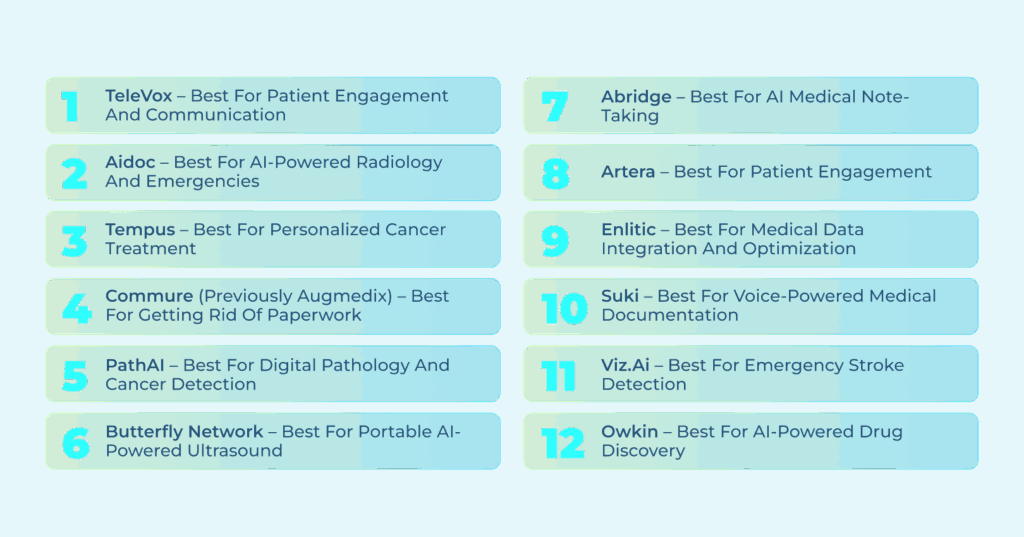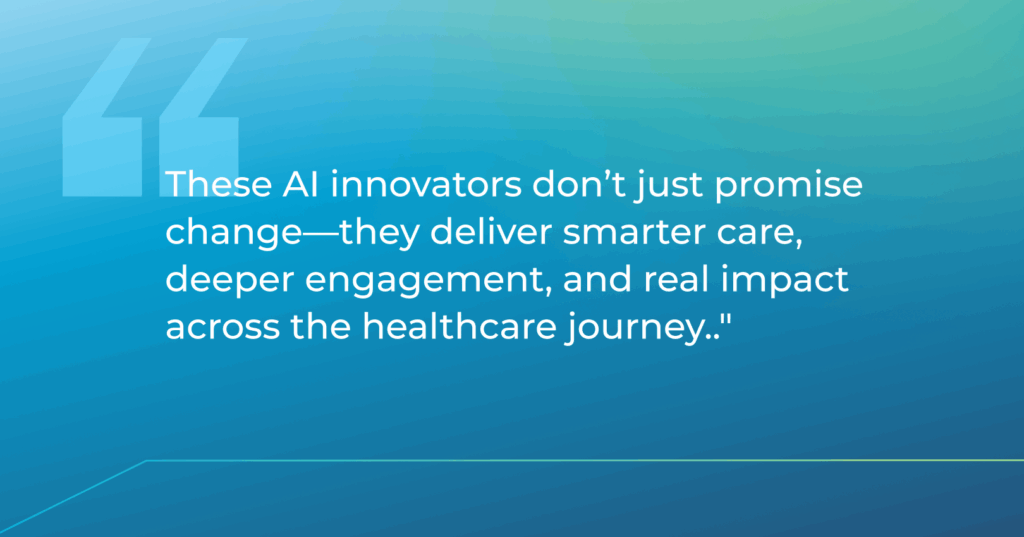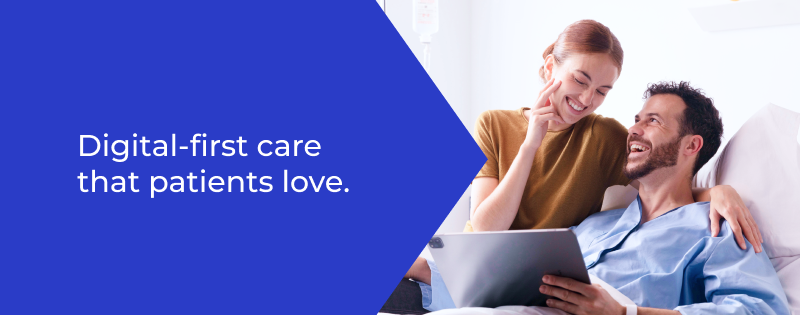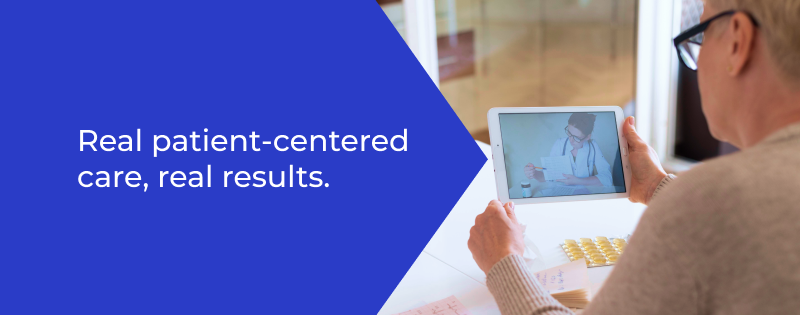What makes a patient return or recommend their healthcare provider to someone else? Net Promoter…

12 AI Healthcare Companies Leading the Future of Patient Engagement
Patient engagement has moved far beyond simple reminders or post‑visit calls. Today, it’s about understanding each patient and responding at the right moment.
The top AI healthcare companies are leading that shift, building tools that connect the dots between accurate diagnosis and meaningful provider‑patient communication.
This list highlights the ones focused on real‑world impact and not hype. They’re the ones tackling the daily challenges that shape care and conversation, and ultimately making the healthcare experience better for everyone.

1. TeleVox – Best for Patient Engagement and Communication
TeleVox helps healthcare providers manage patient conversations across text, email, phone, and web chat. Their solutions work for both small practices (50 providers or fewer) and mid‑to‑large health systems, making it easier to stay connected without overloading staff.
What Makes TeleVox Stand Out?
At HLTH 2024, TeleVox showcased new capabilities within its patient relationship management suite, including SMART SMS, the SMS channel for SMART Agent, and tools designed to reduce readmissions.
These innovations continue to earn industry recognition, with TeleVox winning three consecutive MedTech Breakthrough Awards, including the 2024 Patient Relationship Innovation Award for SMART SMS and the 2025 Best Practice Management Solution for its Practice Edition platform designed for smaller providers.
SMART Agent is an inbound interactive virtual agent that helps patients handle routine tasks like scheduling their appointment, checking billing information, requesting prescription refills, or asking for links to forms.
For outbound communication, TeleVox offers automated reminders, follow‑ups, and patient marketing outreach through its patient engagement platform, helping reduce no‑shows, improve scheduling efficiency, and acquire new patients.
Communication is a big challenge in healthcare. Patients forget appointments, don’t understand discharge instructions, and call with questions that tie up staff.
TeleVox automates the routine back‑and‑forth so staff can focus on patients who need hands‑on attention. You can expect a 30% drop in no‑shows after implementing TeleVox’s automated reminder system, a reduction that can significantly shift your patient engagement ROI.
2. Aidoc – Best for AI-Powered Radiology and Emergencies
Aidoc builds AI that watches medical scans around the clock. When someone comes into the ER with a potential stroke, Aidoc’s software can spot the problem and alert the medical team before a radiologist even looks at the scan.
What Makes Aidoc Stand Out?
The company has FDA approval for detecting strokes in brain scans. Their AI never sleeps. It’s always checking every scan that comes through, flagging urgent cases first. They also partnered with NVIDIA this year to make their tools work better in more hospitals, giving medical teams those extra minutes back.
3. Tempus – Best for Personalized Cancer Treatment
Tempus collected medical data from millions of patients to build the largest clinical database in healthcare. Their AI reads through genetic test results, medical records, and research papers to suggest which cancer treatments might work best for each patient.
What Makes Tempus Stand Out?
Tempus assists doctors in selecting treatments according to the unique tumor genetics of each patient. It’s as though they have a team of researchers working on every patient.
Their revenue has increased by 35% since 2023. In November, they acquired Ambry Genetics for $600 million to provide additional genetic testing capabilities. They also started a joint venture in Japan with SoftBank to develop personalized treatment recommendations.
4. Commure (Previously Augmedix) – Best for Getting Rid of Paperwork
Remember when doctors used to listen to patients instead of typing on computers? Augmedix brings that back. Their AI listens to doctor visits and writes the medical notes automatically.
What Makes Commure Stand Out?
Commure bought Augmedix for $139 million in July 2024. Augmedix was already making $13.5 million per quarter, 40% more than the year before. The buyout gives them more resources to compete with other AI documentation companies flooding the market.
Doctors hate paperwork. Patients hate talking to the back of a laptop screen. Augmedix fixes both problems by handling the documentation so doctors can focus on being doctors.
5. PathAI – Best for Digital Pathology and Cancer Detection
PathAI helps pathologists spot cancer faster. You know those glass slides doctors peer at under microscopes? PathAI digitizes them and uses AI to circle anything that looks suspicious.
What Makes PathAI Stand Out?
The FDA gave them clearance to use their AISight platform for actual diagnoses in 2024. Quest Diagnostics liked what they saw and bought PathAI’s lab in Memphis. The company also made it onto Deloitte’s fastest-growing tech companies list at number 420.
Do note that we’re running out of pathologists. Medical schools aren’t producing them fast enough to replace the ones retiring. PathAI helps the ones we have work faster and catch things they might miss. It’s like having a second pair of expert eyes on every case.
6. Butterfly Network – Best for Portable AI-Powered Ultrasound
Butterfly Network packed an entire ultrasound machine into something the size of an electric razor. Their iQ3 device plugs into your phone and gives you the same imaging quality you’d get from those huge machines on wheels.
What Makes Butterfly Network Stand Out?
The FDA approved the iQ3 in January 2024. It costs under $2,000 compared to $100,000 for traditional ultrasound machines. More importantly, it comes with AI that helps doctors who aren’t ultrasound experts figure out what they’re looking at.
Emergency room doctors use these to check for internal bleeding in car accident victims. Rural family doctors use them to check pregnancies without sending women on three-hour drives to the nearest hospital. It’s the kind of technology that actually saves lives by making good care available everywhere.
7. Abridge – Best for AI Medical Note-Taking
Abridge sits in the corner during doctor visits and takes notes. The AI listens to everything, understands medical jargon, and writes up proper documentation that insurance companies will actually accept.
What Makes Abridge Stand Out?
Abridge raised $150 million in February 2024 because everyone realizes how broken medical documentation is. Their AI does more than transcribe. It knows the difference between what’s important for the medical record and casual conversation.
Many family doctors once spent hours each evening writing up notes from the day’s appointments. Now, with Abridge, they simply review the AI‑generated notes, make a few edits, and log off. The system captures details they might have missed and formats everything correctly for billing, freeing up time for life outside the clinic.
8. Artera – Best for Patient Engagement
Artera built an AI that acts like an exceptional medical receptionist. It sends appointment reminders, follows up after visits, and can even predict which patients are likely to skip their appointments based on their past behavior.
What Makes Artera Stand Out?
Artera’s AI looks at patterns like maybe someone always cancels Monday morning appointments, or certain patients need three reminders instead of one. Then it automatically adjusts how and when it reaches out.
Artera cut no-show rates by a significant margin just by sending smarter reminders. The AI also handles simple questions from patients, freeing up staff to deal with more complex issues.
9. Enlitic – Best for Medical Data Integration and Optimization
Enlitic fixes the messy data problem that frustrates radiologists. Medical images come in different formats, different qualities, and different systems. Enlitic’s AI cleans up this chaos and makes all the data work together.
What Makes Enlitic Stand Out?
Enlitic launched their Ensight 2.0 platform with better data migration tools and showcased it at major medical conferences. They also partnered with GE HealthCare to demonstrate how AI can work better when the underlying data is properly organized.
Hospital IT directors often spend months trying to get different imaging systems to work together. Enlitic addresses this by creating a unified data framework that makes all medical images searchable and usable.
10. Suki – Best for Voice-Powered Medical Documentation
Suki lets doctors talk to their computers instead of typing. You speak naturally about the patient visit, and Suki writes proper medical notes, suggests billing codes, and handles all the administrative stuff doctors hate.
What Makes Suki Stand Out?
Suki quadrupled its revenue in 2024 and raised $70 million to expand. They partnered with Google Cloud to add patient summaries and Q&A functionality that helps doctors answer questions about patient history without digging through charts.
The difference between Suki and other voice tools is that Suki actually understands medical workflows. It helps physicians complete documentation 72% faster on average. They can now finish their notes during their shifts instead of working late every evening. That’s life-altering for someone who works 12-hour shifts.
11. Viz.ai – Best for Emergency Stroke Detection
Viz.ai built an AI that can spot strokes in brain scans faster than any human. When someone comes to the ER with stroke symptoms, the AI analyzes their CT scan and immediately alerts the stroke team if it finds a large vessel occlusion, the kind of stroke that needs emergency surgery.
What Makes Viz.ai Stand Out?
The FDA approved Viz.ai’s stroke detection software because it consistently catches strokes that might otherwise be missed or delayed. UC Davis Health was the first hospital in Sacramento to use the platform, and they’ve seen dramatic improvements in treatment times.
Time is brain tissue when it comes to strokes. Every minute of delay means more permanent damage. Viz.ai reduces stroke treatment times from hours to minutes. That said, the AI is not meant to replace doctors. It’s designed to make sure the right specialists get alerted immediately so they can save patients who might otherwise have permanent disabilities.
12. Owkin – Best for AI-Powered Drug Discovery
Owkin uses AI to find new drugs by analyzing massive amounts of medical data that pharmaceutical companies couldn’t process before. They leverage multimodal data access and deploy interpretable AI to identify new drug targets.
What Makes Owkin Stand Out?
Owkin is working on “agentic reasoning to create biological artificial superintelligence.” Their CEO Thomas Clozel has spoken at the World Economic Forum about how pharma companies can safely use AI for drug discovery. He notes that they’re building AI that can actually reason about complex biological processes.
Most experimental drugs fail in clinical trials since we don’t understand diseases well enough. Owkin’s AI is able to guess which drug candidates are most likely to succeed prior to companies spending years and millions of dollars to test them. It’s like having a crystal ball for pharma research.
Our Criteria for Selecting these Healthcare AI Solution Providers
Choosing the right AI healthcare companies for this list wasn’t random. We looked at real performance, not just marketing promises. Here’s exactly what these companies had to prove to make the cut:
- Proven Clinical Impact – Every company on this list shows measurable improvements in patient outcomes.
- FDA Approval and Regulatory Compliance – We only included top AI healthcare companies that have successfully navigated regulatory chains. FDA clearance proves their technology meets medical-grade standards.
- Financial Stability and Growth – Healthcare providers can’t afford to bet on companies that might disappear next year. Our selections show strong revenue growth, plus significant funding rounds that indicate investor confidence.
- Real-World Adoption by Healthcare Systems – We focused on companies already working in hospitals and clinics, not just research labs. So, they’re production-ready solutions.
- Addresses Critical Healthcare Problems – Each company tackles a genuine pain point that healthcare workers face daily.
- Technology That Scales – The best AI companies for healthcare build solutions that work whether you’re a small practice or a major health system. TeleVox, for example, serves both 50-provider practices and large hospital networks. That flexibility matters for long-term viability.
- Integration Capabilities – Healthcare runs on complex, interconnected systems. We selected companies whose AI works with existing EHRs, imaging systems, and workflows rather than requiring complete infrastructure overhauls.
How to Choose the Best AI Platform as a Healthcare Provider
Picking the right AI healthcare companies for your organization isn’t something you want to get wrong. The stakes are high. You’re dealing with patient care, staff efficiency, and your bottom line, all of which depend on making the smart choice. Here’s what actually matters when you’re evaluating AI partners:
- Proven Return on Investment – Don’t just trust their demos. Ask for hard ROI numbers. How much time will this save your staff? What’s the actual cost reduction? The best platforms show you exactly how they’ll pay for themselves within the first year.
- Excellent Security and Compliance – Your patient data needs to be protected. Look for platforms that treat HIPAA compliance seriously. You need encryption, audit trails, and security protocols that align with standard regulations.
- Compatible With Your Current Systems – Top AI healthcare companies build their solutions to integrate smoothly with what you already have, not force you to start over.
- Room to Grow – Your patient volumes will increase. New regulations will emerge. Hence, choose platforms built to scale and adapt, not ones that lock you in with limitations.
- Clinical Proofs – Anyone can claim their AI works. The companies worth your time have published studies, real-world data, and measurable outcomes. They should show you accuracy rates and patient outcome improvements from actual healthcare settings.
- Clean Data Management – AI is only as good as the data you feed it. Look for platforms that help you maintain data quality and provide clear governance tools.

Why Leading Healthcare Providers Choose TeleVox
Imagine giving your patients a smart, always‑on assistant that answers questions, books appointments, refills prescriptions, handles payments, and more, without dropping a single task on your team’s shoulders. That’s exactly what TeleVox delivers.
For over three decades, more than 7,000 healthcare providers have trusted us to keep patients engaged, reduce no‑shows, and lighten the load on busy staff.
Powered by our HIPAA‑compliant Smart Agent, we do more than just automation. We’re the AI concierge your patients never knew they needed. Our healthcare solutions create smooth, human‑like experiences every step of the way.
Wondering about our results and immediate impact. See them for yourself. Book a demo today and discover how TeleVox can improve every patient interaction from the very first call to the final follow‑up.



